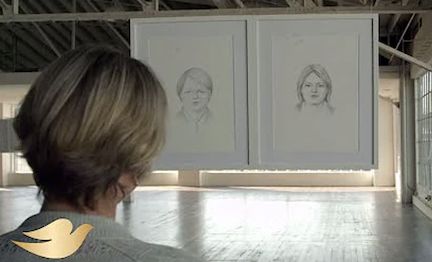Sketching the Distortions of Self-Perception
Dove Soap is an icon in the American health and beauty industry. They have long been celebrated for their targeted ad campaigns exploring true beauty. One of Dove's recent tag lines is "You are more beautiful than you think." So, for its campaign titled Real Beauty Sketches, the company used a forensic artist to prove it.
Dove asked an FBI-trained forensic artist, Gil Zamora, to create sketches of seven women. The women were hidden behind a curtain; he never saw their faces. Rather, he “blind sketched” each one based on their self-descriptions. He then created a second “blind sketch” based on the descriptions of strangers who spent time “observing” the seven subjects.
The sketches were then revealed, side-by-side, to the subjects for them to observe the often startling difference between their self-perception and the perception of others.
Can you say “eye opening”?!

Dove says, as a company, they are committed to helping all women realize their personal beauty potential. This particular campaign was all part of a broader marketing campaign to help women discover their “real beauty.”
God is all about helping us to see our "real" beauty — not the beauty of external features, but the true beauty revealed from within as we conform ourselves to the image of Christ. There is no other, no greater image to which we can conform ourselves or compare ourselves.
Alternate Application: The question is not how we see ourselves, or even how others see us. The only question is how does God see us? In Him, we are declared perfect, blameless, holy. We are His beautiful Bride for whom He is returning. Walk in the light of how HE sees us!
"For the Lord sees not as man sees: man looks on the outward appearance, but the Lord looks on the heart” (1 Samuel 16:7, ESV).
"So God created man in his own image, in the image of God he created him; male and female he created them" (Genesis 1:27, ESV).
"And we all, with unveiled face, beholding the glory of the Lord, are being transformed into the same image from one degree of glory to another. For this comes from the Lord who is the Spirit" (2 Corinthians 3:18, ESV).
"And to put on the new self, created after the likeness of God in true righteousness and holiness" (Ephesians 4:24, ESV).
Uncombable Hair Syndrome
How many times have you awakened, looked in the mirror, and said, “Man, I’m having a bad hair day.” Well, for the 100 or so people around the world with the ultra-rare disease, Uncombable Hair Syndrome, they wake up every single morning to that reality. UHS stems from a genetic mutation through which the hair shaft takes on a rather triangular shape, causing the hair to stand up straight from the head, making it impossible for the hair to lay flat. As such, sufferers look unkempt, ungroomed, unruly, all the time.
No amount of effort on their part can manage their “bad hair.” Not rollers, nor, irons, nor gels, nor sprays.
One might think, just from looking, that these people simply don’t care about their appearance, or are blind to how unkempt and unruly they look. That’s because it takes a deep look into their genetic code to see just what’s really going on.

For most of us, we look into the mirror and we say to ourselves, “Hey, I don’t look too bad today!” And even if we awaken with a bad hair day, we can pull out the hot rollers or hair gel, and voilà, problem solved. We can present with a fairly tidy appearance. But what if we looked deeper into the mirror, into the core of our being?
At our core, in our soul of souls, we are all unkempt, untidy, and unruly. That’s because we are all born with a spiritual mutation … a sinful nature.
No amount of behavioral grooming can correct it. Oh sure, we can mask it, and present it with a pretty tidy appearance. We can justify it and say that it's not so bad. But we can’t correct it on our own. Only the “washing and renewing” of our spirit can do that.
“Not by works of righteousness which we have done, but according to His mercy He saved us, through the washing of regeneration and renewing of the Holy Spirit.” (Titus 3:5, NKJV)
Do You Feel Plutoed?
Poor Pluto. First, it’s a planet and then it’s not anymore. It has become the Rodney Dangerfield of our solar system. In an award-winning move that probably did not make the “sub planet” feel better, the term “plutoed” was declared the Word of the Year by the American Dialect Society in Anaheim, California, a little over a decade ago. The word means “to demote or devalue someone or something.”
Do you ever feel “plutoed”? Do you feel like people don’t appreciate you like they should? You may get that feeling on the job, when you’re working harder than anyone else and somebody else gets the credit, the promotion, and the attention. You may get that feeling in your marriage or in the home, whether you’re the husband, wife, parents, or children. You may even sometimes feel “plutoed” by the church. Maybe you feel that your difficulties or problems are being ignored. You might think your contributions or ideas are not taken seriously enough. I’m sure elders, deacons, preachers, Bible class teachers, their spouses, along with everyone else, has to deal with that “plutoed” feeling periodically.
Will you remember a few things? First, remember the value God placed on your soul by sending Jesus to die to save it (Galatians 2:20). Second, remember that God’s system of rewarding is on His time and His terms, but He will not let faithful service go unnoticed or unblessed (Matthew 6:4, 6, 16). Third, remember that you are valuable because of who you are, a child of God (1 Peter 2:5, 9; Revelation 1:5-6). Finally, remember your obligation to help everyone around you feel valued. Afterall, isn't that the way you prefer to be treated? (Luke 6:31). It’s the Christ-like way (Acts 10:38). There are plenty of people around you who are sorely in need of being “de-plutoed," even as God has uniquely equipped you for the task (1 Corinthians 12:8-12).
Experience the value that God has attributed to you by showing it to all those for whom Christ died.
"I have been crucified with Christ and I no longer live, but Christ lives in me. The life I now live in the body, I live by faith in the Son of God, who loved me and gave himself for me" (Galatians 2:20).
"For you know that it was not with perishable things such as silver or gold that you were redeemed from the empty way of life handed down to you from your ancestors, but with the precious blood of Christ, a lamb without blemish or defect" (1 Peter 1:18-19).